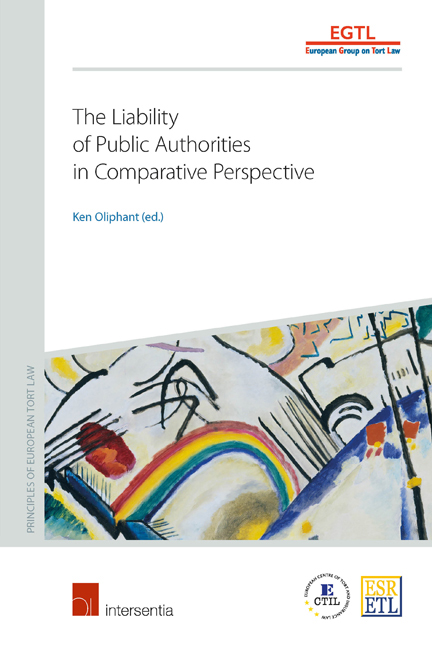Book contents
- Frontmatter
- Preface
- Contents
- List of Authors
- Introduction
- Questionnaire
- PART I PUBLIC AUTHORITY LIABILITY OUTLINED
- PART II CASE STUDIES
- Case 1 Negligent Safety Certification (Maladministration)
- Case 2 Wrongfully Cancelled Licence (Improper Administrative Decision)
- Case 3 Missing Warning (Improper Administrative Omission – Omission following Prior Creation of Risk)
- Case 4 Fireworks Store (Improper Administrative Omission – Pure Omission)
- Case 5 Unfounded Criminal Charges (Prosecutorial and Judicial Acts)
- Case 6 Unpasteurised Cheese (Possibly Improper Regulatory Act – Improper Regulatory Omission)
- Case 7 Police Cross-fire (Properly Conducted Administrative Activities)
- PART III CONCLUSIONS
Case 6 - Unpasteurised Cheese (Possibly Improper Regulatory Act – Improper Regulatory Omission)
from PART II - CASE STUDIES
Published online by Cambridge University Press: 27 November 2017
- Frontmatter
- Preface
- Contents
- List of Authors
- Introduction
- Questionnaire
- PART I PUBLIC AUTHORITY LIABILITY OUTLINED
- PART II CASE STUDIES
- Case 1 Negligent Safety Certification (Maladministration)
- Case 2 Wrongfully Cancelled Licence (Improper Administrative Decision)
- Case 3 Missing Warning (Improper Administrative Omission – Omission following Prior Creation of Risk)
- Case 4 Fireworks Store (Improper Administrative Omission – Pure Omission)
- Case 5 Unfounded Criminal Charges (Prosecutorial and Judicial Acts)
- Case 6 Unpasteurised Cheese (Possibly Improper Regulatory Act – Improper Regulatory Omission)
- Case 7 Police Cross-fire (Properly Conducted Administrative Activities)
- PART III CONCLUSIONS
Summary
An abnormally high number of food poisoning cases are, on reasonable grounds, initially attributed by a minority of the government's scientific advisers to the consumption of unpasteurised cheese. The Minister for Food Safety, M, consequently exercises her statutory power to issue regulations relating to her area of responsibility and imposes an indefinite ban on the sale of cheese that has not been pasteurised. In doing so, she seeks to balance the possible risk to the public disclosed by the scientific evidence with the economic interests of producers of unpasteurised cheese. After a period of months, it emerges that the food poisoning outbreak was wholly unconnected with the consumption of unpasteurised cheese, but M delays for over a year before lifting the ban. M (and/or the State) is now sued by manufacturers of unpasteurised cheese who suffered loss because of the ban, including the spoilage of cheese that had been manufactured but could not be sold, the cost of hiring pasteurisation equipment for the duration of the ban, and loss of profit. It is alleged, first, that M acted improperly in imposing the ban and maintaining it for three months and, secondly, that she ought to have lifted it on the basis of the new evidence at the end of that period and only delayed lifting the ban through inefficiency. It is further argued that the manufacturers affected should receive compensation even if M did not act improperly.
AUSTRIA
If the lifting of the ban came too late, the State will be liable for M's omission to declare an end to the ban in a timely manner. If instead the prolongation of the ban was within M's discretion and the actual duration not entirely beyond reasonable interpretation of the law, courts may come to the opposite conclusion, as proceedings under the AHG are not meant to overturn executive (or judicial) decisions just because there would have been an alternative outcome possible within the range of justifiable deliberations. Liability under the AHG requires fault attributable to the State.
BELGIUM
This sixth case allows us to recall that the State may be held liable for adopting or not adopting regulations. First of all, liability may be incurred when a regulatory act violates a legal act or the Constitution (for example, a Royal Decree violating the constitutional principle of equality of citizens).
- Type
- Chapter
- Information
- The Liability of Public Authorities in Comparative Perspective , pp. 793 - 822Publisher: IntersentiaPrint publication year: 2016



